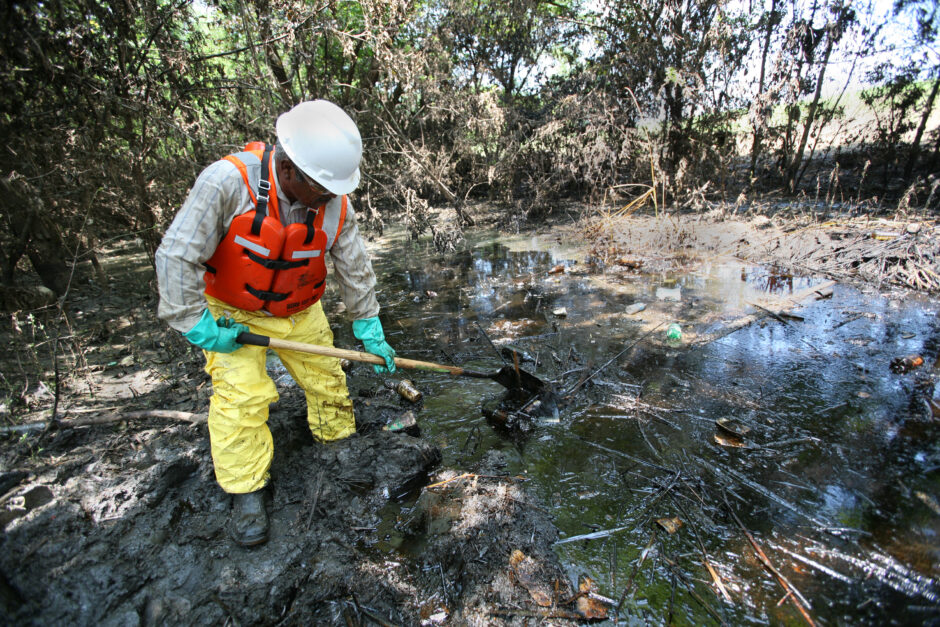Impacts of Dilbit on Fish

Coffeyville. KS, July 19, 2007 - A contractor working on removing pools of oil released by a local refinery. Flooding and oil contamination destroyed much of the low lying town. (Credit: Leif Skoogfors / FEMA via Wikimedia Commons Public Domain)
Whether intentional dumping or the result of accidental spills and disasters like the 2010 Deepwater Horizon and Kalamazoo River spills, water bodies everywhere are exposed to pollutants like dilbit which can lead to long-term problems for aquatic systems and their inhabitants. Signs of these disturbances are evident in climbing rates of intersex fish, declines in species recruitment, and other issues that impact the quality of life for aquatic species.
Pollutants can enter the water through a variety of ways and can even be natural. Nutrient pollution, also referred to as nutrient loading, occurs when nutrients that are essential to a functioning aquatic ecosystem enter the water in high quantities that overload the system. Typically, these nutrients are phosphorous or nitrogen, both of which are connected to declines in water quality and increased algal blooms when occurring in high quantities. Nutrient pollution like this is common after runoff events during storms and in waters neighboring agricultural land.
In contrast to natural pollutants, unnatural or toxic chemicals can also be introduced into waterways as a result of intentional dumping, accidental spills or inadequate sanitation techniques that allow some chemicals to enter waterways. Some of the most devastating events have been spills, as they often lead to high volumes of waste entering the water at a fast and uncontrollable rate–one such material is known as dilbit. The American Petroleum Institute reports more than 190,000 miles of liquid petroleum pipelines in the U.S., many of which transport dilbit and other oil derivatives. Dilbit spills can happen anywhere across the country, and the impacts on fish and aquatic systems remain to be fully understood.
What is Dilbit
According to Trans Mountain, a petroleum transport corporation, the name Dilbit comes from its composition, diluted bitumen. Dilbit is a material that forms when the crude oil bitumen mixes with chemical solvents, forming a less dense material. According to the Canadian Energy Pipeline Association, natural bitumen has a very high viscosity, flowing like molasses. Bitumen in its natural form would take a long time to move through the miles of pipelines across the U.S. To remedy this, the oil is diluted, and dilbit is transported.
While there are regulations surrounding the transport of dilbit, accidents still happen. For example, in 2010, there was a dilbit spill on the Kalamazoo River in Michigan. A 40-foot segment of pipe carrying dilbit from Canadian tar sands suddenly ruptured, spilling more than 800,000 gallons of petroleum that took years to clean up. Like other crude oil byproducts, dilbit is highly flammable and toxic when consumed or exposed in high quantities.
How Dilbit Spills Impact Fish
Fish and other wildlife that live and rely on an aquatic system will suffer complications as a result of the exposure. A 2015 study from Queen’s University and the Royal Military College of Canada examined how dilbit exposure impacts fish specifically.
The researchers found that toxic concentrations of dilbit can cause exposed fish to develop physiological and genetic deformities, such as abnormal swim bladders. Science Direct states that swim bladders are necessary for maintaining buoyancy and also play a role in respiration, sound production, and possibly perception of pressure fluctuations. Without a properly functioning swim bladder, fish can have trouble avoiding predators and catching prey.
In the study, the embryos of Japanese medaka were exposed to Access Western Blend dilbit for 17 days. While the dilbit didn’t have immediate lethal effects, the deformities caused by the toxic material can be a death sentence to fish in the wild and drastically lowers survival rates. The study’s full findings are published in the journal Aquatic Toxicology.



Pingback: FishSens Magazine | Split Opinions: Aquaculture in Lake Huron - FishSens Magazine